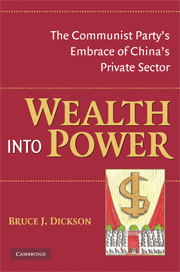Book contents
- Frontmatter
- Contents
- List of Tables and Figure
- Acknowledgments
- 1 Introduction
- 2 The Party's Promotion of the Private Sector
- 3 Co-opting the Capitalists
- 4 Bridges and Branches: The CCP's Institutional Links to the Private Sector
- 5 Views on the Economic, Political, and Social Environments
- 6 Private Entrepreneurs in Public Service: Participation in China's Formal Political Institutions
- 7 The Ripple Effects of Privatization: Corruption, Inequality, and Charity
- 8 Conclusion
- Appendix: Survey Design
- Bibliography
- Index
8 - Conclusion
Published online by Cambridge University Press: 05 September 2012
- Frontmatter
- Contents
- List of Tables and Figure
- Acknowledgments
- 1 Introduction
- 2 The Party's Promotion of the Private Sector
- 3 Co-opting the Capitalists
- 4 Bridges and Branches: The CCP's Institutional Links to the Private Sector
- 5 Views on the Economic, Political, and Social Environments
- 6 Private Entrepreneurs in Public Service: Participation in China's Formal Political Institutions
- 7 The Ripple Effects of Privatization: Corruption, Inequality, and Charity
- 8 Conclusion
- Appendix: Survey Design
- Bibliography
- Index
Summary
The Chinese Communist Party has defied predictions of its imminent demise. From the start of the reform era, observers have anticipated the collapse of communism in China as a result of growing economic prosperity and the inherent contradictions between a market economy and a Leninist political system. One main line of thinking draws its inspiration from the insights of modernization theory, which notes the clear correlation between economic modernity and political democracy. As the size of China's economy grows and as individual incomes and quality of life increase, the prospects for democracy are said to increase correspondingly. A second line of thinking is based on the social changes that accompany economic development. As the economy shifts from agriculture to industry and services, and the population shifts from rural to urban areas, a middle class begins to grow and a civil society begins to emerge to organize people with similar interests. At the same time, these economic and structural changes lead to changes in basic political values, leading people to expect more political liberties to match their economic freedoms. Economic development in China has also entailed the gradual decline of the centrally planned economy and the commensurate increase in the market economy and the size of the private sector. This shift in economic activity has created a steadily growing number of private firms and private entrepreneurs. Because economic wealth not controlled by the state is an inherent threat to an authoritarian regime, China's growing private sector is seen as an indicator of declining CCP control and improved prospects for political change.
Information
- Type
- Chapter
- Information
- Wealth into PowerThe Communist Party's Embrace of China's Private Sector, pp. 237 - 254Publisher: Cambridge University PressPrint publication year: 2008
Accessibility standard: Unknown
Why this information is here
This section outlines the accessibility features of this content - including support for screen readers, full keyboard navigation and high-contrast display options. This may not be relevant for you.Accessibility Information
- 1
- Cited by
